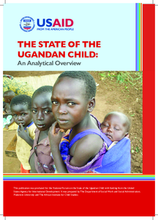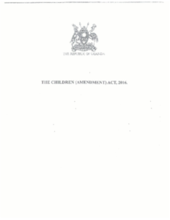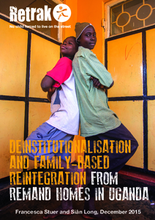This country page features an interactive, icon-based data dashboard providing a national-level overview of the status of children’s care and care reform efforts (a “Country Care Snapshot”), along with a list of resources and organizations in the country.
demographic_data
childrens_living_arrangement
children_living_without_bio
social_work_force
key_stakeholders
Key Stakeholders
Add New DataOther Relevant Reforms
Add New Datadrivers_of_institutionalisation
Drivers of Institutionaliziation
Add New Datakey_research_and_information
Key Data Sources
Add New DataThe Children Act (Uganda)
Country Care Review: Uganda
Prevalence and number of children living in institutional care: global, regional, and country estimates
The National Integrated Early Childhood Development Policy Action Plan (2016-2021) of Uganda
Catholic Care for Children in Uganda: A Family for Every Child - Findings from a Midterm Evaluation
Acknowledgements
Data for this country care snapshot was contributed by a consultant with the Data for Impact (D4I) Project at Palladium Group LLC.
Displaying 281 - 290 of 418
This bulletin highlights the key objectives and key amendments of Uganda's Children Act Amendment of 2016. It also outlines the process by which the Bill was developed and approved and lays out next steps for implementing the Act and ensuring the rights of children in Uganda.
The State of the Ugandan Child: An Analytical Overview focuses on four thematic areas, namely: health and nutrition, education, child protection and child participation; with emphasis placed on the girl child.
The overall objective of this study was to deepen understanding on the experiences and support systems of grandparent-headed households with children of prisoners (CoP) in Uganda.
The Children (Amendment) Act of 2016 is an Act to amend the Children's Act Cap. 59 of Uganda to enhance the protection of children; to strengthen the provision for guardianship of children; to strengthen the conditions for intercountry adoption; to prohibit corporal punishment; to provide for the National Children Authority; repeal the National Council for Children Cap. 60 and to provide for other related matters.
This chapter first traces the etymology of the definition of “orphan” and its attendant “crises.” Then, using examples from Guatemala and Uganda, the authors consider how the idea of an “orphan crisis” has traveled from development to charitable responses and what effects this has on local child protection systems.
In this short video, Amanda Thorsteinsson documents the proliferation of orphanages in Uganda and the role of well-intentioned Westerners in contributing to this problem.
Many children in Uganda are taken to Europe and the United States for adoption every year by guardians who pay local law firms and agencies between four to nine million shillings. The law firms and agencies have consequently turned adopt
This report presents findings of two components of a Rapid Assessment of Catholic Care for Children in Uganda. The objective of the assessment was to examine the emerging legal framework pertaining to child protection and its implications for Catholic sisters and brothers who work with vulnerable children and their families.
This report looks at the adaptation of Retrak’s Family Reintegration Standard Operating Procedures in the context of children in temporary youth detention institutions, known as remand homes, in Uganda.
This video from Child's i Foundation documents the story of Mercy from Redeemer House in Jinja, Uganda.





